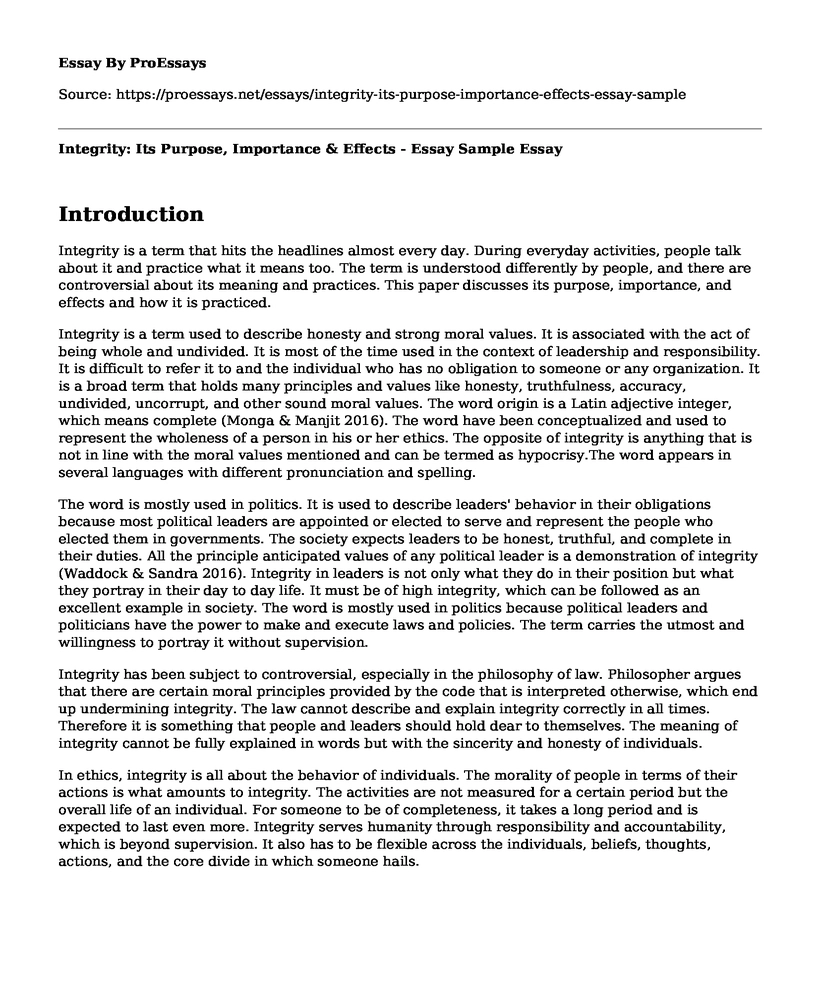Introduction
Integrity is a term that hits the headlines almost every day. During everyday activities, people talk about it and practice what it means too. The term is understood differently by people, and there are controversial about its meaning and practices. This paper discusses its purpose, importance, and effects and how it is practiced.
Integrity is a term used to describe honesty and strong moral values. It is associated with the act of being whole and undivided. It is most of the time used in the context of leadership and responsibility. It is difficult to refer it to and the individual who has no obligation to someone or any organization. It is a broad term that holds many principles and values like honesty, truthfulness, accuracy, undivided, uncorrupt, and other sound moral values. The word origin is a Latin adjective integer, which means complete (Monga & Manjit 2016). The word have been conceptualized and used to represent the wholeness of a person in his or her ethics. The opposite of integrity is anything that is not in line with the moral values mentioned and can be termed as hypocrisy.The word appears in several languages with different pronunciation and spelling.
The word is mostly used in politics. It is used to describe leaders' behavior in their obligations because most political leaders are appointed or elected to serve and represent the people who elected them in governments. The society expects leaders to be honest, truthful, and complete in their duties. All the principle anticipated values of any political leader is a demonstration of integrity (Waddock & Sandra 2016). Integrity in leaders is not only what they do in their position but what they portray in their day to day life. It must be of high integrity, which can be followed as an excellent example in society. The word is mostly used in politics because political leaders and politicians have the power to make and execute laws and policies. The term carries the utmost and willingness to portray it without supervision.
Integrity has been subject to controversial, especially in the philosophy of law. Philosopher argues that there are certain moral principles provided by the code that is interpreted otherwise, which end up undermining integrity. The law cannot describe and explain integrity correctly in all times. Therefore it is something that people and leaders should hold dear to themselves. The meaning of integrity cannot be fully explained in words but with the sincerity and honesty of individuals.
In ethics, integrity is all about the behavior of individuals. The morality of people in terms of their actions is what amounts to integrity. The activities are not measured for a certain period but the overall life of an individual. For someone to be of completeness, it takes a long period and is expected to last even more. Integrity serves humanity through responsibility and accountability, which is beyond supervision. It also has to be flexible across the individuals, beliefs, thoughts, actions, and the core divide in which someone hails.
Conclusion
In conclusion, the concept of integrity is broad and understood differently in various disciplines. As discussed in the paper, it is associated mostly with politics, societal ethics, philosophy, and law. There are also many other areas in which integrity applies. The understanding of integrity depends on the values and the norms of different societies across the globe. It is regarded as strong terms that carry a lot of meaning that can only be demonstrated with utmost sincerity by individuals. The level of its purpose has brought it under mixed ideas and impressions from law firms and philosophers. Generally, it is used to describe the moral principles and values recognized by society.
Work Cited
Monga, Manjit. "Integrity and its antecedent: A unified conceptual framework of integrity." The Journal of Developing Areas 50.5 (2016): 415-421.
Waddock, Sandra. "Mindfulness and integrity: The ongoing challenge of leadership development." Business ethics: New challenges for business schools and corporate leaders. Routledge, 2016. 110-126.
Cite this page
Integrity: Its Purpose, Importance & Effects - Essay Sample. (2023, Feb 27). Retrieved from https://proessays.net/essays/integrity-its-purpose-importance-effects-essay-sample
If you are the original author of this essay and no longer wish to have it published on the ProEssays website, please click below to request its removal:
- Critical Thinking Sample: Leadership-Follower Relationship Example
- IKEA: Making Life Better for the World's Many People Essay
- Essay Sample on Leadership Relationships
- Essay Sample on Benefits of Organizational Diversity
- NIKE Company Management - Paper Example
- Traits of Frederick Douglass' Leadership Essay
- Corporate Sustainability in Organizations - Essay Sample







